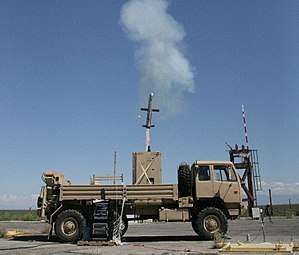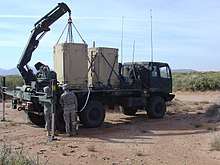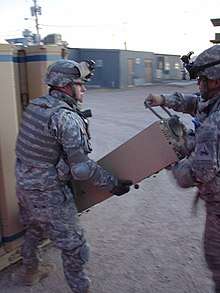XM501 Non-Line-of-Sight Launch System
The Non-Line of Sight Launch System (NLOS-LS) was a self-contained missile launcher system that was under development by NETFIRES LLC, a partnership between Lockheed Martin and Raytheon. Each Container Launch Unit (CLU) holds 15 missiles, and a self-locating networked communications system. CLUs can be linked for coordinated launching, with the missiles fired and controlled remotely via autonomous vertical launch. The weapon is roughly 2 metres tall.
| Non-Line of Sight Launch System | |
|---|---|
 NLOS missile launching from a CLU on the back of a truck | |
| Type | Self-contained missile launch system |
| Place of origin | United States |
| Production history | |
| Designer | Lockheed Martin and Raytheon |
| Unit cost | US$466,000 per missile |
| Produced | Canceled |
| Specifications | |
| Mass | 3,150 lb (1.58 short tons; 1.41 long tons) |
| Length | 45 in (1.1 m) |
| Width | 45 in (1.1 m) |
| Height | 78 in (2.0 m) |
Launch platform | CLU of 15 canistered missiles on truck, ship or ground |
The program was cancelled early 2011. It was being developed for the United States Navy's Littoral Combat Ship, but has been criticised for performance issues. The Griffin missile has been recommended for use instead. NLOS-LS was to be used primarily on the United States Army's Future Combat Systems before it was canceled.
Concept


There were to be two types of missile used with NLOS-LS: the Precision Attack Munition (PAM) and the Loitering Attack Munition (LAM). The LAM was originally contracted to Lockheed Martin Missiles and Fire Control, but the contract was terminated after costs rose and tests went poorly. As it stands now, the PAM is the only armament currently being designed for the NLOS-LS.[1]
- Height: 69 in (1,800 mm)
- Length: 11 in (280 mm)
- Width: 11 in (280 mm)
Precision Attack Munition (PAM)
Used to attack vehicles, armor, bunkers, and other targets of opportunity. Uses 3 modes of guidance, GPS/INS, semi-active laser homing, and autonomous imaging infrared. Carries a multi-mode warhead effective against several types of targets. It also includes an online library of pictures of targets, so that it can visually identify what it is homing in on.
Specifications
- Weight: 117 lb (53 kg)
- Diameter: 7 in (180 mm)
- Length: 60 in (1,500 mm)
- Guidance: GPS/INS, imaging infrared, semi-active laser homing.[2]
- Datalink: Networked for in-flight updates, retargeting and images.
- Motor: Variable thrust rocket motor.
- Range: 25 mi (40 km)
Loitering Attack Munition (LAM)
A loitering munition designed to fly to a preset area and loiter while autonomously seeking out targets.
- Datalink:> Networked for in-flight updates, retargeting and images.
- Motor: Micro turbojet.
- Range: 45 mi (72 km) with 30 min loiter time.
Development
- November 2002 – First guided flight of Precision Attack Missile.[3]
- December 2005 – Successful Loitering Attack Missile Boost Test Vehicle (BTV) flight test at Eglin Air Force Base, FL.[4]
- April 2007 – Successful test launch of a Precision Attack Missile from a CLU at White Sands Missile Range.[5]
- June 2007 – Successful test of Precision Attack Missile warhead against a fortified bunker.[6]
- November 2008 – Successful first test of Precision Attack Missile fired from Container Launch Unit. Scores hit on T-72 tank.[7]
- May 2009 – Captive flight test clears way for over-water flights to test capability against small boats.[8]
- Feb 2010 – Four out of six missiles fail to hit their targets in a Limited User Test.[9]
- April 2010 – US Army calls for program to be canceled.[10]
- 3 May 2010 – The U.S. Army removes the system from their website.[11]
- 12 May 2010 – House Armed Services seapower and expeditionary forces subcommittee moves R&D funding to Navy budget.[12]
- 18 May 2010 – Defense Department approved an Army recommendation to cancel the program[13]
- 6 Jan 2011 – DefSec Gates announces end of program.[14]
- 2012 – US Navy was to begin at-sea testing of LCS surface missile module.[15]
See also
The JUMPER missile system from Israel Aerospace Industries uses a similar concept, but with 8 missiles instead of 15 and without the IR seeker.[16]
- ALAS
- AFT-10 Ground Launcher
- FOG-MPM
- MGM-157 EFOGM
- Polyphem, a similar European project
- Type 96 Multi-Purpose Missile System
References
- NLOS-LS product sheet
- "Raytheon PAM Lockheed Martin LAM (NetFires NLOS-LS) - Designation Systems".
- "Raytheon Precision Attack Missile makes first guided flight - Raytheon PR". Raytheon.com. 18 November 2002. Archived from the original on 6 June 2011. Retrieved 27 May 2011.
- Lockheed Martin, Netfires Llc Successfully Conduct Loitering Attack Missile Boost Vehicle Test - Lockheed Martin PR
- NetFires LLC Precision Attack Missile Launch Paves the Way for Complete System Testing - Netfires LLC PR
- John Pike (28 June 2007). "NetFires LLC Conducts Successful Warhead Demonstration for Precision Attack Missile - NetFires LLC PR". Globalsecurity.org. Retrieved 27 May 2011.
- "NLOS-LS Team Completes First Test Of Missile Fired From Container Launch Unit". Spacewar.com. Retrieved 27 May 2011.
- "NetFires NLOS-LS makes advancement". Upi.com. 5 May 2009. Retrieved 27 May 2011.
- "Challenges Ahead For NLOS-LS". Aviationweek.com. 26 February 2010. Retrieved 27 May 2011.
- "Army asks to cancel NLOS-LS". Armytimes.com. 23 April 2010. Retrieved 27 May 2011.
- "Army modernization | Capabilities". Bctmod.army.mil. Archived from the original on 5 September 2011. Retrieved 27 May 2011.
- "Committee shifts NLOS R&D funding to Navy". Armytimes.com. 12 May 2010. Retrieved 27 May 2011.
- Corrin, Amber (14 May 2010). "Embattled missile program meets its demise". Defensesystems.com. Retrieved 27 May 2011.
- ""Gates Reveals Budget Efficiencies, Reinvestment Possibilities."". Defense.gov. Archived from the original on 29 May 2011. Retrieved 27 May 2011.
- "Army NLOS Dead. Will the Navy Keep it Alive?". Defense-update.com. Retrieved 27 May 2011.
- "IAI Unveils JUMPER Missile for Urban Warfare". Israelnationalnews.com. Retrieved 27 May 2011.
